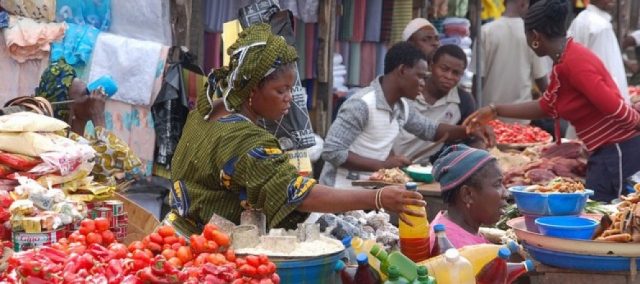
…The inflation tally came in 46bps lower than Cordros’ estimate (27.18% y/y) and 38bps lower than Bloomberg’s median consensus estimate (27.10% y/y).
…Core inflation (All items less farm produce and energy) rose by 69bps to 21.84% y/y (August: 21.15% y/y).
MON, OCT 16 2023-theGBJournal| Nigeria’s headline inflation rose by 92bps to 26.72% y/y in September (August: 25.80% y/y), according to inflation figures data published today by the National Bureau of Statistics (NBS).
The inflation tally came in 46bps lower than Cordros’ estimate (27.18% y/y) and 38bps lower than Bloomberg’s median consensus estimate (27.10% y/y).
However, on a month-on-month basis, headline inflation eased by 108bps to 2.10% (August: 3.18% m/m).
Food prices remained under pressure in September, as food inflation rose significantly by 130bps to 30.64% y/y (August: 29.34% y/y).
The spike in food prices on a year-on-year basis was caused by increases in prices of Oil and fat, Bread and cereals, Potatoes, Yam and other tubers, Fish, Fruit, Meat, Vegetables and Milk, Cheese, and Eggs.
Elsewhere, on a month-on-month basis, food inflation moderated by 2.45%, relative to the 3.87% m/m recorded in August.
In the same vein, the core inflation (All items less farm produce and energy) rose by 69bps to 21.84% y/y (August: 21.15% y/y).
The highest increases were recorded in prices of Passenger Transport by Road, Passenger Transport by Air, Medical Services, Repair of Furniture, Maintenance, and repair of Personal Transport Equipment, etc.
On a monthly basis, the core index settled higher by 5bps to 2.22% m/m in September (August: 2.18% m/m).
The latest inflation figure reflects the intensified pressure on non-food inflation which has remained intact in September as existing factors stoking prices piles pressure.
Notably, currency pressures have worsened as the FX demand and supply dynamics remain the same at the official and unofficial FX markets.
Besides, September marked the beginning of the primary harvest season, and according to the Famine Early Warning Systems Network (FEWSNET), the North-Central and North-Eastern parts of the country experienced significant rainfall deficits in July and August, likely negatively impacting food production prospects during the harvest season.
Also, September coincides with the annual flooding experienced in the country for the past few years.
The Nigeria Hydrological Services has indicated that 178 Local Government Areas (LGAs) in 32 states and the Federal Capital Territory (FCT) were in high danger of severe flooding.
The risks highlighted in combination with lingering increases in PMS prices and higher inputs to limit the gains from the harvest season has combined to pressure the country’s cost of living.
Twitter(X)-@theGBJournal|Facebook-the Government and Business Journal|email:gbj@govbusinessjournal.com| govandbusinessj@gmail.com









